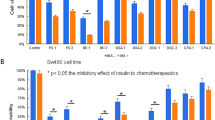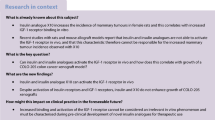Abstract
Purpose
It has been reported that insulin increases the cytotoxic effect in vitro of methotrexate by as much as 10,000-fold. The purpose of this study was to explore the clinical value of insulin as a potentiator of methotrexate.
Patients and methods
Included in this prospective, randomized clinical trial were 30 women with metastatic breast cancer resistant to fluorouracil + Adriamycin + cyclophosphamide and also resistant to hormone therapy with measurable lesions. Three groups each of ten patients received two 21-day courses of the following treatments: insulin + methotrexate, methotrexate, and insulin, respectively. In each patient, the size of the target tumor was measured before and after treatment according to the Response Evaluation Criteria In Solid Tumors. The changes in the size of the target tumor in the three groups were compared statistically.
Results
Under the trial conditions, the methotrexate-treated group and the insulin-treated group responded most frequently with progressive disease. The group treated with insulin + methotrexate responded most frequently with stable disease. The median increase in tumor size was significantly lower with insulin + methotrexate than with each drug used separately.
Discussion
Our results confirmed in vivo the results of previous in vitro studies showing clinical evidence that insulin potentiates methotrexate under conditions where insulin alone does not promote an increase in tumor growth. Therefore, the chemotherapy antitumoral activity must have been enhanced by the biochemical events elicited in tumor cells by insulin.
Conclusions
In multidrug-resistant metastatic breast cancer, methotrexate + insulin produced a significant antitumoral response that was not seen with either methotrexate or insulin used separately.


Similar content being viewed by others
References
Alabaster A, Vonderhaar B, Shafie S (1981) Metabolic modification by insulin enhances methotrexate cytotoxicity in MCF-7 human breast cancer cells. Eur J Cancer Clin Oncol 17:1223–1228
Ayre SG, Perez Garcia y Bellon D, Perez Garcia D Jr (1990) Neoadjuvant low-dose chemotherapy with Insulin in breast carcinomas. Eur J Cancer 26:1262–1263
Cardoso F, Di LA, Lohrisch C, Bernard C, Ferreira F, Piccart M (2002) Second and subsequent lines of chemotherapy for metastatic breast cancer: what did we learn in the last two decades. Ann Oncol 13:197–207
Cullen KJ, Yee D, Sly WS, Perdue J, Hampton B, Lippman ME, Rosen N (1990) Insulin-like growth factor receptor expression and function in human breast cancer. Cancer Res 50:48–53
Gross GE, Boldt DH, Osborne CK (1984) Perturbation by insulin of human breast cancer cell kinetics. Cancer Res 44:3570–3575
Kath R, Schiel R, Muller UA, Hoffken K (2000) Malignancies in patients with insulin-treated diabetes mellitus. J Cancer Res Clin Oncol 126:412–417
Mink PJ, Shahar E, Rosamond WD, Alberg AJ, Folsom AR (2002) Serum insulin and glucose levels and breast cancer incidence: the atherosclerosis risk in communities study. Am J Epidemiol 156:349–352
Osborne CK, Bolan G, Monaco ME, Lippman ME (1976) Hormone responsive human breast cancer in long-term tissue culture: effect of insulin. Proc Natl Acad Sci U S A 73:4536–4540
Oster JB, Creasey WA (1981) Enhancement of cellular uptake of ellipticine by insulin preincubation. Eur J Cancer Clin Oncol 17:1097–1103
Schilsky RL, Bailey BD, Chabner BA (1981) Characteristics of membrane transport of methotrexate by cultured human breast cancer cells. Biochem Pharmacol 30:1537–1542
Shackney SE, McCormack GW, Cocheral GJ (1978) Growth rate patterns of solid tumors and their relation to responsiveness to therapy. Ann Intern Med 89:107–121
Silva JM, Garcia JM, Dominguez G, Silva J, Rodriguez R, Portero JL, Corbacho C, Provencio M, Espana P, Bonilla F Silva JM, Garcia JM, Dominguez G, et al (2000) DNA damage after chemotherapy correlates with tumor response and survival in small cell lung cancer patients. Mutat Res 456:65–71
Therasse P, Arbuck SG, Eisenhauer EA, Wanders J, Kaplan RS, Rubinstein L, Verweij J, Van Glabbeke M, van Oosterom AT, Christian MC, Gwyther SG (2000) New guidelines to evaluate the response to treatment in solid tumors. European Organization for Research and Treatment of Cancer, National Cancer Institute of the United States, National Cancer Institute of Canada. J Natl Cancer Inst 92:205–216
Author information
Authors and Affiliations
Corresponding author
Rights and permissions
About this article
Cite this article
Lasalvia-Prisco, E., Cucchi, S., Vázquez, J. et al. Insulin-induced enhancement of antitumoral response to methotrexate in breast cancer patients. Cancer Chemother Pharmacol 53, 220–224 (2004). https://doi.org/10.1007/s00280-003-0716-7
Received:
Accepted:
Published:
Issue Date:
DOI: https://doi.org/10.1007/s00280-003-0716-7




